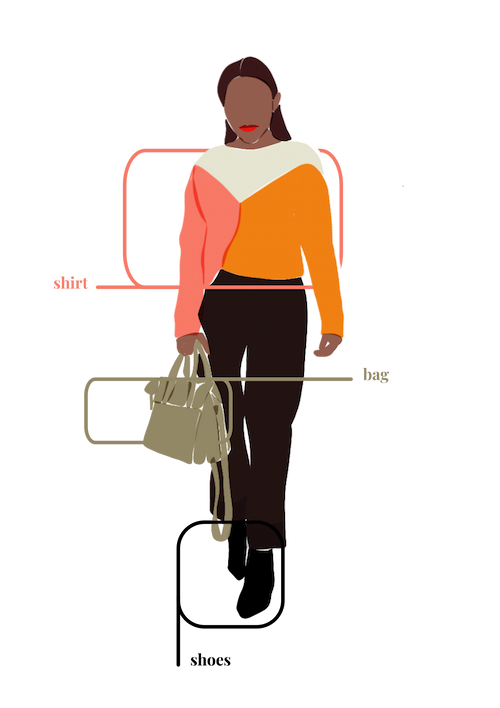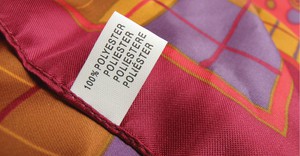- Clothes
- Bags
- Accessories
-
Inspiration
- Shoes
You’ve Been Wearing Plastic & Oil (Pretty Much Every Day)

And no, we haven’t lost the plot!
If you buy fast fashion clothes regularly, the chances are you have indeed been wearing plastic and oil.
Perhaps you’re wearing them at this very moment as you shake your head skeptically.
“How exactly have I been wearing plastic and oil?!”
63% of clothes are made from plastic-derived synthetic materials—with polyester being the most popular —which are created using oil. Literally.
For example, polyester is derived from polyethylene terephthalate, a chemical compound commonly known as PET.
“But isn’t that what plastic bottles are made of?”
Exactly!
In fact, the average wardrobe hides 379 litres of oil. Find out how many were used to make your clothes with this handy fashion oil calculator.
The oily reality behind your plastic-derived clothes

Since polyester doesn’t feel like plastic when you’re wearing it, you’re probably wondering why we’re making such a fuss about it.
The problems with polyester: one of the most unsustainable and polluting fabrics
- It relies on fossil fuels—whose extraction and sourcing have a terrible environmental impact—and a carbon-heavy manufacturing process. The latter is responsible for 40% of all fashion emissions!
- It involves toxic chemicals like antimony, which pollutes waterways during its production and the air if it’s incinerated
- Your polyester and synthetic clothes release microplastics whenever you wash them. These end up in the ocean and infiltrate every level of its food chain
- Polyester isn’t biodegradable and can require 200 years to break down in landfills
- Synthetic clothes are pretty much impossible to recycle
Pretty bad, huh?
And yet, if you buy clothes from a fast fashion store, the chances are… they’re made of polyester.
"Then, why are fashion brands relying so heavily on plastic-derived fabrics?"
Because they’re extremely cheap!
Synthetic fabrics like polyester allow fast fashion and ultra fast fashion companies like SHEIN and Boohoo to keep their prices so unsustainably low—but with a high environmental cost.
Greener clothes: how to stop wearing plastic and oil
Not a fan of the oil metaphorically gushing out of your wardrobe? Let’s change that!
1. Break free from fast fashion
Watched a haul on TikTok and thought, “I NEED this outfit”? Woke up in a gloomy mood and decided to order some clothes to feel better?
Fast fashion has been keeping you trapped in a vicious cycle: buying new clothes regularly to feel happy or worthy.
So, consider removing distractions on social media, and bookmark our tips to ditch fast fashion.
2. Prioritise natural fabrics (but wisely!)
If you’re tired of wearing plastic, try choosing better fabrics instead.
However, this matter is more nuanced than “natural = good, synthetic = bad.”
For example, from pesticides to water usage, fast fashion clothes made of cotton are just as problematic.
Instead, focus on the most sustainable fabrics, like organic cotton, hemp, linen, bamboo, and modal options.
You can also opt for recycled polyester: it isn’t perfect and it’s still plastic-derived, but it does remove some of the problems associated with virgin polyester.
Check the labels or descriptions carefully, though! Some brands only use a small percentage of recycled fabric, and the rest is normal polyester.
3. Buy your clothes from ethical brands
Reduce the carbon footprint of your clothes even further by choosing brands that care about the environment (and the workers who made the actual clothes, too).
On Project Cece, we brought hundreds of them in one place!
That way, you can browse their collections easily using our practical filters.
Will you still be wearing so much plastic now that you’ve discovered the oily reality it hides?
If you want to make even more sustainable fashion choices, start receiving our tips and inspiration.
Share our story
Related articles
Polyester vs Cotton: Is the Latter REALLY More Sustainable?
What if the 2 most popular fabrics were also some of the WORST for the planet? Here’s a simple polyester vs cotton comparison from a sustainability standpoint.
Polyester vs Recycled Polyester: Is the Latter Eco-Friendly?
Does using plastic bottles and fishnets make this material more sustainable? Let’s look into virgin polyester vs recycled polyester clothing to find out.
Polyester Problems: Cheap Fabric, High Environmental Cost
What’s behind a £4 synthetic dress? Plastic, toxic chemicals, and fossil fuels, to name a few. Discover why polyester and sustainability rarely go together.
Project Cece is a platform that collects ethical fashion from vetted brands and shops in one place. Browse ethical fashion for women and men and find items that fit your style, budget and values!




